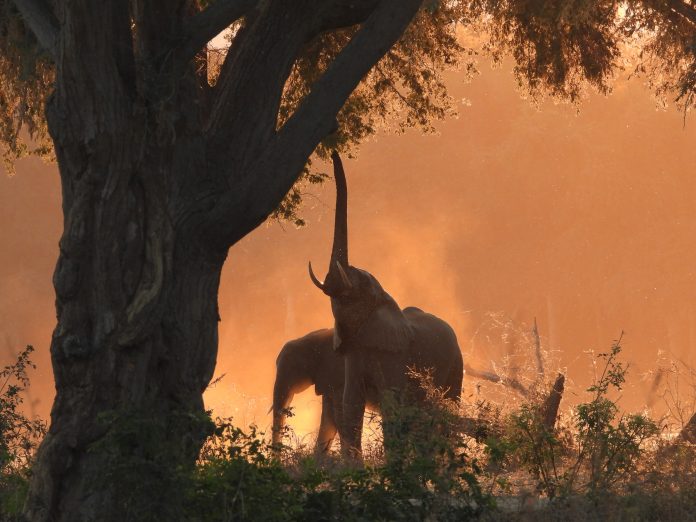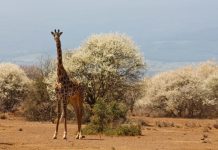The International Council for Game and Wildlife Conservation lifts the lid on the human-elephant conflict, calling for a balanced approach toward conservation efforts
In the village of Tsumbi, about 20 kilometres from Malawi’s Kasungu National Park, tragedy struck one morning on September 16, 2022. John Kayedzeka, a 30-year-old farmer, was trampled to death by one of the 36 elephants that had recently ventured outside the park. John dies while working in his vegetable field. He leaves behind his wife and two children, aged two and five, who face an uncertain future without their main breadwinner. This incident sheds light on the growing issue of human-elephant conflict, which demands attention and a balanced approach toward conservation efforts.
Unforeseen elephant encounters
For the residents of Tsumbi, it was the first encounter with an elephant from the park. Their lack of awareness and preparedness for such an eventuality was evident. Witnesses noted that similar incidents had last occurred in 1981. However, since relocating 263 elephants from Lilongwe National Park to Kasungu Park in July 2022, such encounters have become more frequent.
Elephant attacks: The consequences unfold
Months after the relocation, the local communities continued to suffer from deadly elephant attacks and the destruction of crops and properties. Sadly, this problem extends beyond Malawi’s borders, as reports of human-elephant conflict emerge from countries such as Botswana, Zimbabwe, Zambia, Mozambique, Tanzania, South Africa, and Namibia. It is a pressing issue that necessitates a reassessment of conservation strategies in regions where African elephants thrive.
Protect elephants – the need for balance
While it is imperative to protect elephants, it is equally important to acknowledge the shared living space and resources between humans and these majestic creatures. As population growth and habitat loss bring humans and elephants closer, finding a balanced conservation approach is essential.
Tourism and conservation
Tourism in Africa often revolves around wildlife, including elephants. Therefore, sustainable conservation efforts must focus on preserving elephants for the benefit of local communities. Elephants generate employment opportunities, infrastructure development, and access to healthcare, primarily in tourism-oriented regions.
Threats to elephant conservation
Alongside commercial poaching, the loss of habitat and increasing droughts due to climate change pose significant threats to elephants. When overpopulation leads to excessive grazing, it further damages crucial carbon sinks like forests and grasslands. Exploring management strategies for elephants that consider their role in climate protection is pertinent.
International policies and human rights
In international negotiations, powerful entities in the Global North deter the Southern African states, which hold some of the highest elephant populations, from utilising their natural resources. An example of this is the longstanding ban on ivory trade. Despite stockpiles of confiscated or naturally obtained ivory in these countries, they are prohibited from selling it. This denies affected states the opportunity to benefit from a successful conservation model.
Elephant conservation for human welfare
Rather than being considered a conservation burden, the southern African elephant population can play a vital role in ensuring food security and sustainable income for African communities. Granting sovereign states the right to include elephants in a wildlife-based economy (for meat, leather, etc.) would pave the way toward an inclusive conservation approach.
Conservation efforts: A need for change
It is time for the Global North, which has almost eradicated its own iconic species, to listen to African voices. Instead of perpetuating ill-informed narratives that hinder progress, a change in mindset is required. NGOs and politicians must prioritise the livelihoods and rights of African communities while supporting effective conservation efforts.
The future of human-elephant conflict and conservation
John Kayedzeka’s untimely demise and countless other incidents emphasise the urgent need for a comprehensive and balanced approach to human-elephant conflict and conservation. Collaboration between international organisations, local communities, and governments is crucial for ensuring that elephants and humans can coexist harmoniously while benefiting from sustainable conservation measures. Only with such an approach can we safeguard both the African elephant and the welfare of the people who share their land.
About the authors:
- Stephan Wunderlich is a Forester and Press Officer of the International Council for Game and Wildlife Conservation (CIC).
- Bupe Banda Mhango. CBNRM/Conservation Leader, Zambia, Masters in Conservation Leadership Student, Cambridge University.
- Tinashe Farawo, Head: Public Relations & Communications, Zimbabwe Parks & Wildlife Management Authority.
About: The CIC is a globally trusted, politically independent, intergovernmental organisation that promotes principles of sustainable use.
Contributor Details
More About Stakeholder
-
Empowering wildlife conservation for a sustainable future
The International Council for Game and Wildlife Conservation (CIC) is a non-profit, international NGO that advocates for wildlife conservation through the sustainable use of natural resources.

















